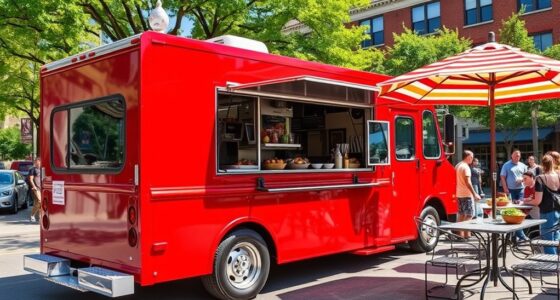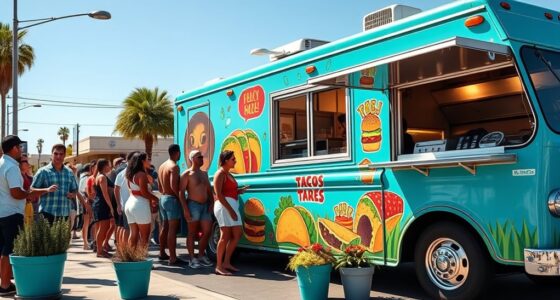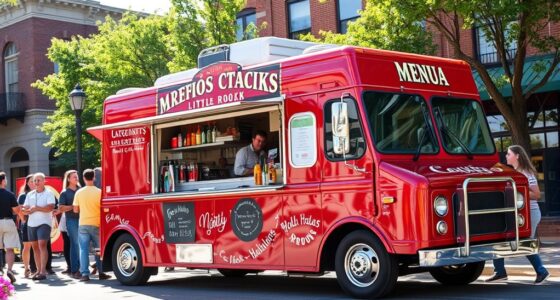Starting a food truck in Yonkers, NY, involves understanding local regulations, permits, and zoning rules. You’ll need to submit applications, pay fees, and pass health and safety inspections. Planning your menu, sourcing ingredients locally, and setting a budget with financing options like SBA loans are vital. Plus, engaging with Yonkers’ vibrant street scene and attending local events will boost your success. Keep exploring, and you’ll discover how to navigate every step smoothly.
Key Takeaways
- Research and comply with Yonkers’ local permits, zoning laws, sanitation standards, and designated vending zones.
- Secure business registration, liability insurance, and obtain necessary health, fire safety, and vehicle inspections.
- Develop a detailed business plan, including menu, branding, and financing options like SBA loans.
- Find a suitable shared kitchen space and invest in proper equipment for efficient operations.
- Implement marketing strategies using social media, contactless payments, and community engagement to attract customers.
Vibrant Yonkers Street Scene

Yonkers’ street scene buzzes with energy, offering a lively backdrop for your food truck venture. The vibrant atmosphere creates perfect opportunities to showcase your food truck branding, making your business memorable amidst the busy streets. To stand out, leverage social media marketing by posting engaging photos and updates that highlight your unique offerings and the local vibe. Connecting with the community online helps attract hungry pedestrians and event organizers alike. As you navigate the energetic streets, use your branding to build recognition, turning passersby into loyal customers. The lively street scene is an asset, but it’s your consistent branding and active social media presence that will turn this energy into sustained success. Embrace the chaos and make your mark in Yonkers’ bustling food scene. Incorporating effective security measures can also help protect your mobile business from potential threats and ensure smooth operations.
Understanding Local Requirements
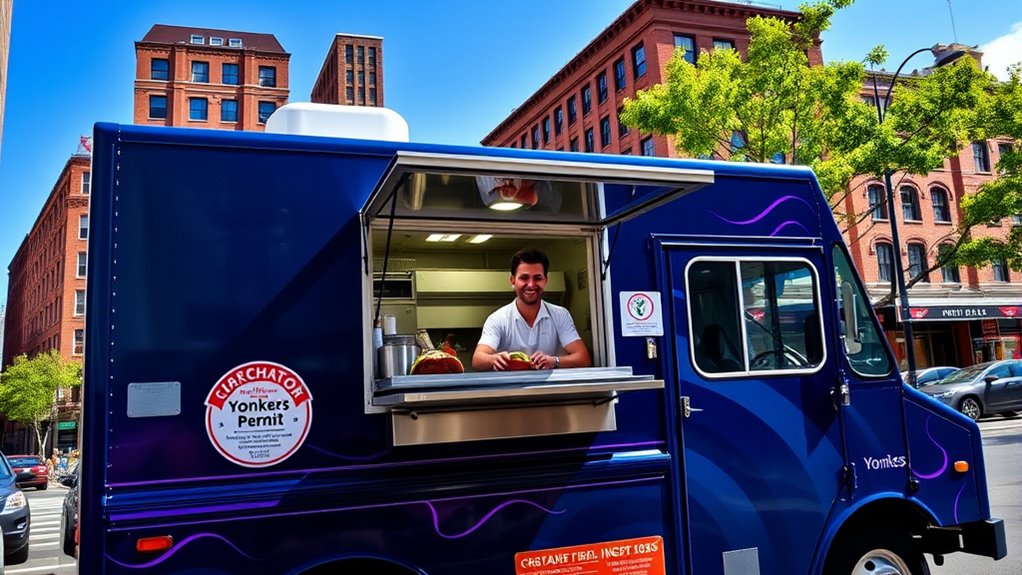
To get started, you’ll need to understand Yonkers’ application process and associated fees for food truck permits. You must also meet sanitation standards and keep thorough records to stay compliant. Additionally, knowing where you can park and sell—such as designated vending zones—is essential for smooth operations. Familiarizing yourself with Halloween product reviews can help you choose the right costumes and accessories for your staff or promotional events.
Application Process and Fees
Navigating the application process for a food truck in Yonkers involves several steps and understanding specific local requirements. To get started, you’ll need to:
- Submit a detailed application with your food truck branding and menu customization plans.
- Pay applicable fees, which vary based on truck size and services offered.
- Provide proof of insurance and vehicle registration.
- Schedule inspections for health, fire safety, and zoning compliance.
Be prepared for potential additional permits or licenses, depending on your menu or location. Costs can include application fees, licensing, and inspection charges. Staying organized and understanding these requirements guarantees a smoother process, allowing you to focus on launching your unique food truck in Yonkers.
Sanitation Standards and Recordkeeping
Understanding sanitation standards and recordkeeping is essential to maintaining compliance with local health regulations for your food truck. You need to follow strict food safety practices to prevent contamination and ensure your customers’ well-being. Regular cleaning of surfaces, proper storage of ingredients, and correct handling of food are crucial components of sanitation standards. Additionally, keeping detailed records of cleaning schedules, temperatures, and inspections helps demonstrate your commitment to food safety. Accurate documentation also makes it easier to identify issues and address them promptly. Yonkers’ health department may require specific logbooks or digital records, so stay informed about local requirements. By adhering to these standards and maintaining thorough records, you reduce risks and build trust with your customers and health authorities.
Designated Vending Zones
Knowing where you can set up your food truck is essential for legal operation in Yonkers. The city designates specific vending zones, so you need to follow local rules. First, check for zones that align with parking regulations to avoid fines. Second, ensure your spot doesn’t interfere with street art or block murals, respecting community aesthetics. Third, confirm that your vending zone permits food trucks and vending activity. Fourth, get any necessary permits or approvals from city officials before setting up. By understanding these requirements, you stay compliant and avoid disruptions. Familiarize yourself with designated zones and avoid unauthorized street art areas, which could lead to penalties. Staying within approved zones ensures a smooth start and helps you build a positive reputation in Yonkers.
Setting Up Your Base of Operations
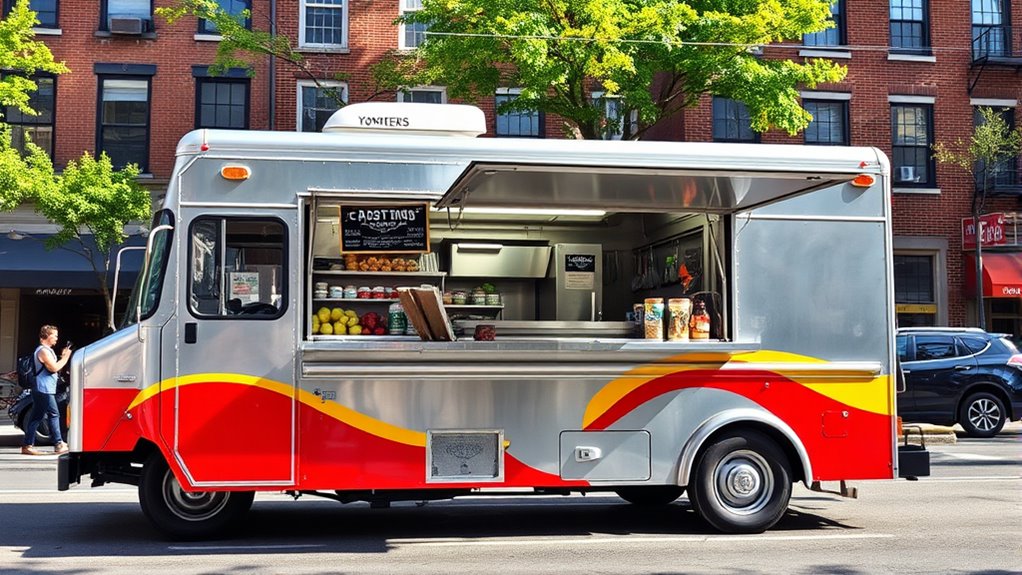
Choosing the right shared kitchen licensing options can save you time and money while meeting health regulations. Next, you’ll need to select custom kitchen equipment tailored to your menu and space constraints. These decisions are essential for establishing a solid base of operations for your food truck. Additionally, understanding digital literacy programs can help you effectively manage your online presence and communicate with customers.
Shared Kitchen Licensing Options
Setting up your food truck in Yonkers often involves utilizing shared kitchen spaces, which can simplify licensing and reduce startup costs. Shared kitchen licensing offers a practical solution for obtaining food truck permits without building your own facility. To get started, consider these options:
- Research licensed shared kitchens in Yonkers that meet health department standards.
- Confirm that the facility holds proper shared kitchen licensing for commercial food prep.
- Ensure the kitchen’s permits cover your intended menu and operations.
- Schedule a health inspection to verify compliance before launching.
Using shared kitchens streamlines the process, saves money, and helps you meet local regulations efficiently. This approach is ideal for new food truck operators looking to establish a compliant, cost-effective base of operations.
Custom Kitchen Equipment Selection
Selecting the right custom kitchen equipment is essential to ensuring your food truck operates efficiently and meets health standards. You need reliable, durable appliances that suit your menu and space. Invest in high-quality custom kitchen appliances designed for mobile use, which can streamline your workflow. Proper equipment maintenance is pivotal to avoid breakdowns and keep your truck running smoothly. Here’s a quick overview:
| Equipment Type | Important Features |
|---|---|
| Commercial Refrigerator | Energy-efficient, compact design |
| Cooking Appliances | Fast heating, easy to clean |
| Food Prep Stations | Space-saving, durable surfaces |
| Food Warmers | Consistent temperature control |
| Ventilation Systems | Proper airflow, noise reduction |
Choose wisely to maximize efficiency and longevity in your food truck.
Budgeting and Financing Your Food Truck

To get your food truck business rolling, you’ll need to plan your budget carefully, starting with the initial vehicle costs. Consider options like Small Business Administration loans to help cover expenses, and don’t forget to account for liability coverage and tax filings. Knowing these key financial factors will set a strong foundation for your success in Yonkers. Additionally, understanding forsale opportunities can aid in purchasing or leasing affordable vehicles suitable for your food truck needs.
Initial Vehicle Purchase Costs
Purchasing your food truck is a significant upfront expense that requires careful budgeting. To manage initial costs effectively, consider these key points:
- Determine your budget based on your financing options and the truck’s condition.
- Explore vehicle financing to spread out payments and improve cash flow.
- Focus on purchase negotiations to get the best price, especially if buying used.
- Factor in additional costs like customization and licensing into your overall investment.
Small Business Administration Loans
Securing a Small Business Administration (SBA) loan can be an effective way to finance your food truck startup in Yonkers, NY, especially if you need favorable terms and lower interest rates. This loan supports your small business by providing the capital needed for equipment, permits, and initial expenses. When preparing your loan application, understand the criteria and gather necessary documents such as business plans and financial statements. Keep in mind that the approval process can take time, so plan accordingly. To help visualize your financing options, consider this table:
| Loan Type | Interest Rate | Repayment Term |
|---|---|---|
| SBA 7(a) | 6-8% | Up to 10 years |
| SBA CDC/504 | 4-6% | 10-20 years |
| Microloan | 8-13% | Up to 6 years |
Knowing your options guarantees you select the best fit for your small business.
Liability Coverage and Tax Filings
Having extensive liability coverage is essential to protect your food truck from potential accidents, damages, or legal claims that could otherwise jeopardize your business. You should secure liability insurance to safeguard against lawsuits or damages. Additionally, proper tax registration is vital to stay compliant with local regulations. To manage this effectively, consider these steps:
- Register your business for tax purposes with the NY Department of Revenue.
- Obtain the necessary liability insurance coverage tailored for food trucks.
- Keep detailed records of all income and expenses for accurate tax filings.
- Stay updated on any changes in local or state tax laws affecting your business.
Designing Your Menu and Pricing Strategy

When designing your menu, focus on sourcing ingredients locally to appeal to your community and guarantee freshness. Calculating ingredient costs helps you set prices that cover expenses while remaining competitive. Balancing quality and affordability is key to building a successful food truck business in Yonkers. Incorporating creative problem-solving into your menu development can help you adapt to ingredient availability and customer preferences, ensuring your offerings stand out.
Locally Sourced Ingredient Selection
Choosing locally sourced ingredients can considerably enhance your menu’s freshness and authenticity, attracting customers who value quality and community support. When focusing on ingredient selection, consider these key points:
- Build relationships with local farmers and vendors to ensure consistent, fresh supplies.
- Highlight your use of locally sourced ingredients on your menu to appeal to eco-conscious customers.
- Adjust your menu seasonally to reflect what’s available locally, keeping your offerings innovative and fresh.
- Price your dishes competitively by understanding the value of high-quality, locally sourced ingredients without overpricing.
Ingredient Cost Calculations
Accurately calculating ingredient costs is essential for designing a profitable menu and setting the right prices. To do this effectively, you need to analyze ingredient pricing carefully, considering bulk discounts and seasonal fluctuations. Keep detailed records of how much each ingredient costs from your suppliers to guarantee accurate cost assessments. Negotiating with suppliers can help you secure better deals, lowering your overall expenses. Remember, consistent supplier negotiations can lead to more favorable terms, giving you flexibility in pricing. Use this data to determine your food cost percentage, ensuring your menu prices cover costs and generate profit. Regularly review your ingredient costs to adapt to market changes, maintaining a balance between affordability for customers and profitability for your food truck.
Technology and Operations

Implementing contactless mobile payments can speed up transactions and improve customer satisfaction. Using real-time stock tracking software helps you stay on top of inventory and reduce waste. These technologies streamline your operations, letting you focus more on serving great food.
Contactless Mobile Payment Options
Adopting contactless mobile payment options can streamline transactions and enhance customer experience for your food truck in Yonkers. With contactless payments, customers can pay quickly using their smartphones or tap cards, reducing wait times. To implement this effectively, consider these key steps:
- Choose reliable mobile payment options like Apple Pay, Google Pay, or Samsung Pay.
- Integrate a secure payment terminal compatible with contactless payments.
- Train staff on processing mobile payments smoothly.
- Promote your new contactless payment options to attract tech-savvy customers.
Real-Time Stock Tracking Software
To keep your food truck running smoothly, real-time stock tracking software is essential for managing inventory efficiently. It helps you monitor stock levels live, preventing shortages or overstocking. With accurate inventory management, you can quickly identify which ingredients need replenishing and avoid waste. This software also enhances supply chain coordination, ensuring your suppliers deliver on time and reducing delays. By integrating real-time tracking, you gain better visibility into your inventory flow, making ordering more precise and reducing costs. It streamlines operations, allowing you to focus on preparing food and serving customers. Ultimately, real-time stock tracking software keeps your food truck’s inventory organized, helping you stay responsive and maintain high-quality service throughout your busy days.
Marketing and Growing Your Presence

You can boost your visibility by listing your truck on local event calendars and obtaining the necessary permits. Encouraging satisfied customers to leave reviews and participating in loyalty programs will keep them coming back. These strategies help expand your presence and attract new customers in Yonkers.
Local Event Calendars and Permits
Leveraging local event calendars and obtaining the necessary permits are essential steps in marketing your food truck and expanding your presence in Yonkers. By regularly checking local event calendars, you can identify opportunities to serve at community gatherings, festivals, and markets, boosting your visibility. For permit acquisition, follow a clear process:
- Research Yonkers’ specific food truck permits and regulations.
- Submit applications early to avoid delays.
- Ensure your truck meets health and safety standards.
- Keep permits updated and renewal dates in mind.
This proactive approach helps you stay compliant and seize valuable event opportunities, increasing your customer base. Using local event calendars and securing permits effectively positions your food truck for growth and success in Yonkers.
Customer Reviews and Loyalty Programs
Customer reviews and loyalty programs are powerful tools to build your food truck’s reputation and encourage repeat business in Yonkers. Managing reviews effectively helps you understand what customers love and identify areas for improvement, boosting your review management efforts. Positive customer loyalty is cultivated when you respond promptly and genuinely to feedback, showing you value their experience. Implementing loyalty programs, like punch cards or digital rewards, incentivizes customers to return. These strategies create a sense of community and trust around your brand, encouraging word-of-mouth referrals. Consistently showcasing positive reviews on social media and your website reinforces your reputation. By prioritizing review management and customer loyalty, you’ll foster strong relationships, attract new customers, and grow your food truck’s presence in Yonkers.
Navigating Yonkers’ Vibrant Food Scene
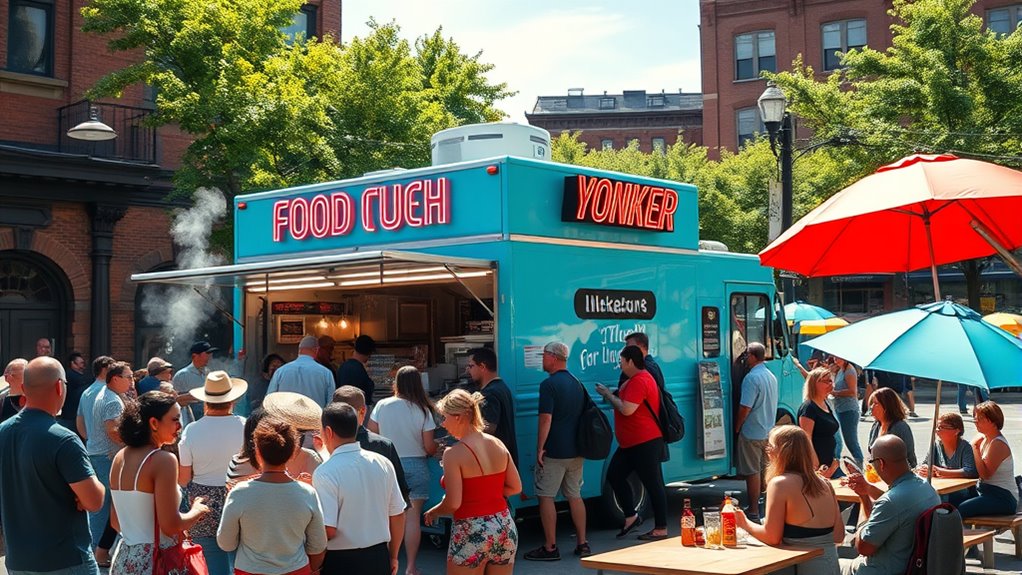
Exploring Yonkers’ vibrant food scene requires a keen understanding of its diverse culinary landscape. To succeed, focus on building relationships and staying adaptable. Here are key tips:
Understanding Yonkers’ diverse cuisine is key; build relationships and stay flexible to thrive in its vibrant food scene.
- Vendor Networking: Connect with local vendors to share insights, collaborate on events, and stay updated on popular spots.
- Food Truck Maintenance: Keep your truck in top shape to prevent breakdowns and ensure smooth operations during busy hours.
- Research Hotspots: Identify areas with high foot traffic, like parks or busy streets, to maximize visibility.
- Participate in Events: Join local food festivals and markets to increase exposure and attract loyal customers.
Frequently Asked Questions
Are There Specific Health and Safety Standards for Mobile Food Vendors in Yonkers?
Yes, you need to follow specific health and safety standards for mobile food vendors in Yonkers. You must pass regular health inspections to guarantee compliance with food safety regulations. These include maintaining proper food handling, sanitation, and storage practices. The local health department requires you to obtain necessary permits and adhere to food safety guidelines to protect your customers and avoid penalties. Staying compliant helps your food truck operate smoothly and successfully.
What Permits Are Required for Operating a Food Truck During Special Events?
Like Icarus reaching for the sun, you’ll need the right permits to operate during special events. You must obtain specific food truck permits and adhere to special event regulations in Yonkers. Check with local authorities to make certain of compliance, including event-specific licenses and health approvals. Securing these permits guarantees you’re flying high legally and safely, ready to serve your delicious offerings to enthusiastic crowds without risking a fall.
How Can I Find the Best Locations for Food Truck Parking in Yonkers?
You can find the best parking locations for your food truck in Yonkers by checking local parking regulations and zoning laws. Look for high foot traffic areas like parks, busy streets, or near community events to maximize customer accessibility. Visit the Yonkers city website or contact local authorities for permits and restrictions, ensuring your chosen spots comply with parking rules and offer convenient access for your customers.
Are There Restrictions on Serving Alcohol From a Food Truck in Yonkers?
Ever wonder if you can serve alcohol from your food truck in Yonkers? You generally can’t without proper alcohol licensing, which is required for beverage service. Yonkers has strict regulations, and serving alcohol from a mobile unit is usually prohibited unless you obtain special permits. Always check with local authorities first to confirm you’re compliant and avoid fines. Want to serve drinks legally? Secure the necessary licenses before offering alcohol from your food truck.
What Are the Best Practices for Hiring and Training Staff for My Food Truck?
You should focus on effective staff training and smart hiring strategies. Start by clearly defining roles and skills needed, then use targeted interviews and practical assessments to select reliable team members. During staff training, emphasize food safety, customer service, and your menu. Regularly update training to improve performance and guarantee compliance. Building a motivated, well-trained team helps your food truck run smoothly and keeps customers coming back.
Conclusion
Starting your food truck in Yonkers offers a colorful journey through a lively culinary landscape. Embrace the opportunities that come with each challenge, knowing they gently guide you toward growth and success. With passion and perseverance, you’ll find your niche amid the vibrant street scene, transforming obstacles into stepping stones. Trust in your vision, and let the city’s energy subtly shape your path, turning your dreams into a flavorful reality that resonates deeply with the community.


